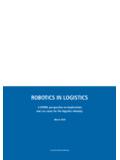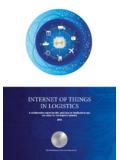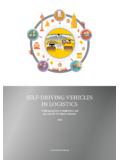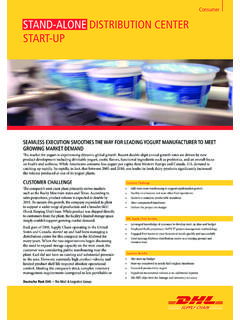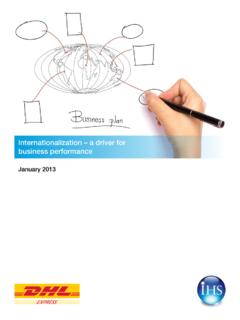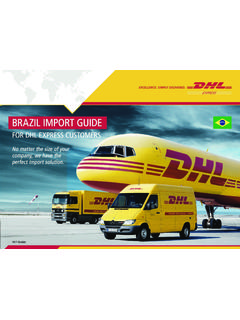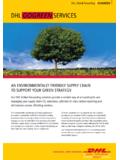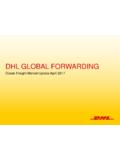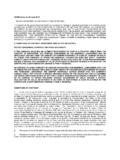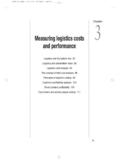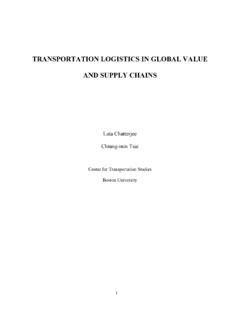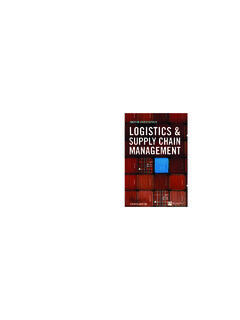Transcription of Rethinking logistics with access over ownership May 2017
1 SHARING ECONOMY logistics . Rethinking logistics with access over ownership May 2017. Powered by DHL Trend Research PUBLISHER. DHL Customer Solutions & Innovation Represented by Matthias Heutger Senior Vice President Strategy, Marketing & Innovation DHL CSI, 53844 Troisdorf, Germany PROJECT DIRECTOR. Dr. Markus K ckelhaus Vice President Innovation and Trend Research DHL Customer Solutions & Innovation PROJECT MANAGEMENT, CONTENT, AND EDITORIAL OFFICE. Gina Chung, Ben Gesing, Marianne Dahmen Innovation and Trend Research, Deutsche Post DHL Group AUTHOR. Ben Gesing Project Manager, DHL Trend Research PREFACE. DHL's foundations lie in the Sharing Economy. In its early Looking ahead, observing the abundance of idle assets, days, DHL offered free plane tickets to private travelers in infrastructure, and knowledge, sharing instead of owning exchange for giving up their baggage allowance to trans- will become the new normal.
2 logistics can be one of the port critical documents needed to clear ocean freight cargo core drivers of this development. From helping people at the destination. In this way, DHL allowed the original to share their products and services, to using innovative bill of lading documents to arrive long before container- sharing platforms to fully utilize our logistics networks ized ocean shipments made port, a problem at the time and assets, together we can achieve new levels of where containers were increasing the speed and volume efficiency and value creation. of ocean freight. Once on the ground, a network of couriers brought the documents to their final destination. We hope you find this an insightful read, and we look forward to collaborating with you on how to embrace Today it is time to revitalize the concept of Sharing Sharing Economy logistics in your organization.
3 Economy logistics . Traditional sources of competitive advantage came from deep industry knowledge and acquiring assets to build, distribute, and sell a product or service. In recent years the tremendous power of digital Yours sincerely, sharing platforms and crowd-based access to existing assets has started to rewrite the rules of business for many industries. From our roots as a courier service in the 1960s, we know that sharing is not new. What is new are the tools and attitudes with which people are sharing: smartphones and mobile technologies combined with shifting societal values are allowing companies with new business models to proliferate at unprecedented speed, scale, and valuation. We have seen the mobility and hospitality industries fundamentally changed by Sharing Economy incumbents, Matthias Heutger Dr.
4 Markus K ckelhaus with other industries like staffing, heavy industry, and Senior Vice President Strategy, Vice President Innovation logistics not far behind. As leaders in logistics , it is time Marketing & Innovation and Trend Research to rethink our industry in the context of the Sharing DHL Customer Solutions & DHL Customer Solutions &. Economy. To support you in navigating your organization Innovation Innovation through this new world, our trend report will help you understand the following: What is the Sharing Economy? What best practices from other industries can be applied to logistics organizations? What new business opportunities can the Sharing Economy create for your organization? 2 Table of Contents PREFACE .. 1. 1 UNDERSTANDING THE SHARING ECONOMY.
5 3. The Sharing Economy: A Paradigm Shift .. 3. Sharing Isn't New: The Confluence of Technology and Social Trends .. 5. Challenges in the Sharing Economy .. 8. Sharing Economy logistics : Why Now? .. 10. 2 BEST PRACTICES FROM OTHER INDUSTRIES .. 11. Hospitality: How Airbnb Changed the Game and Grew the Market .. 11. Staffing: The Rise of Freelancing and On-demand Labor .. 12. Heavy Industry: Sharing Critical B2B Assets .. 13. Mobility: Urban Orchestration beyond Ride 14. 3 SHARING ECONOMY logistics USE CASES .. 15. Truly Shared Warehousing .. 15. Urban Discreet Warehousing .. 16. Community Goods On-demand .. 18. logistics Asset Sharing .. 19. Transport Capacity Sharing .. 21. On-demand Staffing .. 23. logistics Data Sharing .. 24. Assessing the Sharing Economy Readiness of Your 25.
6 CONCLUSION AND OUTLOOK .. 26. SOURCES .. 27. Understanding the Sharing Economy 3. 1 UNDERSTANDING THE SHARING ECONOMY. The Sharing Economy: A Paradigm Shift This contrasts with traditional business models in which companies focus on building industry know-how to pro- For many years, business ran on a linear logic: manufactur- duce the best assets for use (see figure 2). For example, ers manufactured, distributors distributed, and customers Uber essentially provides average cars in a premium way bought goods, owning these for all of their useful life. but owns no Airbnb makes everyday apartments That paradigm has started to change. From about 2008, look luxurious on its site to drive higher booking people have begun to subscribe to a new model of con- TaskRabbit exposes performance metrics on its Taskers sumption, where temporary access to goods and services to help users get the best service for low-skilled is preferred over actual ownership .
7 A new breed of Figure 2 outlines five key business factors that starkly digitally native companies that sit on top of vast supply contrast traditional and Sharing Economy players. systems and own only the mobile user interface are driving this significant shift in value. SHARING. TRADITIONAL. This phenomenon is often referred to as the Sharing ECONOMY. Economy, a term best defined as the economic activity BUSINESS. MODEL LINEAR NETWORK. of digital platforms that facilitate transactions where users ASSET ASSET HEAVY ASSET LIGHT. are given temporary access to a service provider's other- STRUCTURE. wise underutilized asset, service, or skill (see figure 1). CORE INDUSTRY SOFTWARE. These transactions incur no change in ownership of COMPETENCE SPECIFIC.
8 The goods or service. In contrast to traditional industry COMPANY OPERATIONAL CUSTOMER. FOCUS PERFORMANCE EXPERIENCE. players, Sharing Economy companies are characterized by network-based business models that take a small WORKFORCE FIXED ON-DEMAND. commission per transaction. The primary value of these sharing platforms lies in the use of software to drive Figure 2: Comparison of traditional and Sharing Economy models;. Source: DHL Trend Research customer experience surrounding a given asset. SHARING ECONOMY BUSINESS MODEL. Service Sharing of Asset Provider User Recommendation access to access to Market Market Offer Request Service Fee Platform Renting Fee Renting Fee Figure 1: The Sharing Economy business model; Source: Business Model Toolbox 1.
9 Goodwin, T. (2015). 2. Crook, J. / Escher, A. (2015). 3. TaskRabbit Inc. (2017a). 4 Understanding the Sharing Economy For clarification, the Sharing Economy has many synony- As of May 2015, Airbnb had on average 500,000 nightly mous names, often being referred to as the collaborative guests in 191 countries, and, as of September 2016, Uber economy, gig economy, access economy, and on-demand had completed over 2 billion rides in 70 Their economy. Regardless of terminology, the Sharing Economy success has passed a participation tipping point, which is here to stay and will experience significant growth in has invited new entrants in other industries to participate the near future. According to a report by Pricewater- in the Sharing Economy.
10 HouseCoopers, five key sharing sectors (travel, car-sharing, finance, staffing and music/video streaming) have the As the popularity of this new way of doing business potential to increase global revenues of the Sharing grows, it is estimated that since 2014, nearly 50% of Economy from $15 billion USD in 2014 to an estimated North Americans have become familiar with the Sharing $335 billion by 2025 (see figure 3). Economy and over 110 million people have used Sharing Economy An impressive 22% of American Popular examples of the potential for disruption are adults, or 45 million people, have already offered some Airbnb in the hospitality industry and Uber in the mobility product or service in the Sharing Awareness industry. Both have demonstrated that online platforms also varies by platform participating in the Sharing can be used to orchestrate access to (and usage of) assets Economy.
